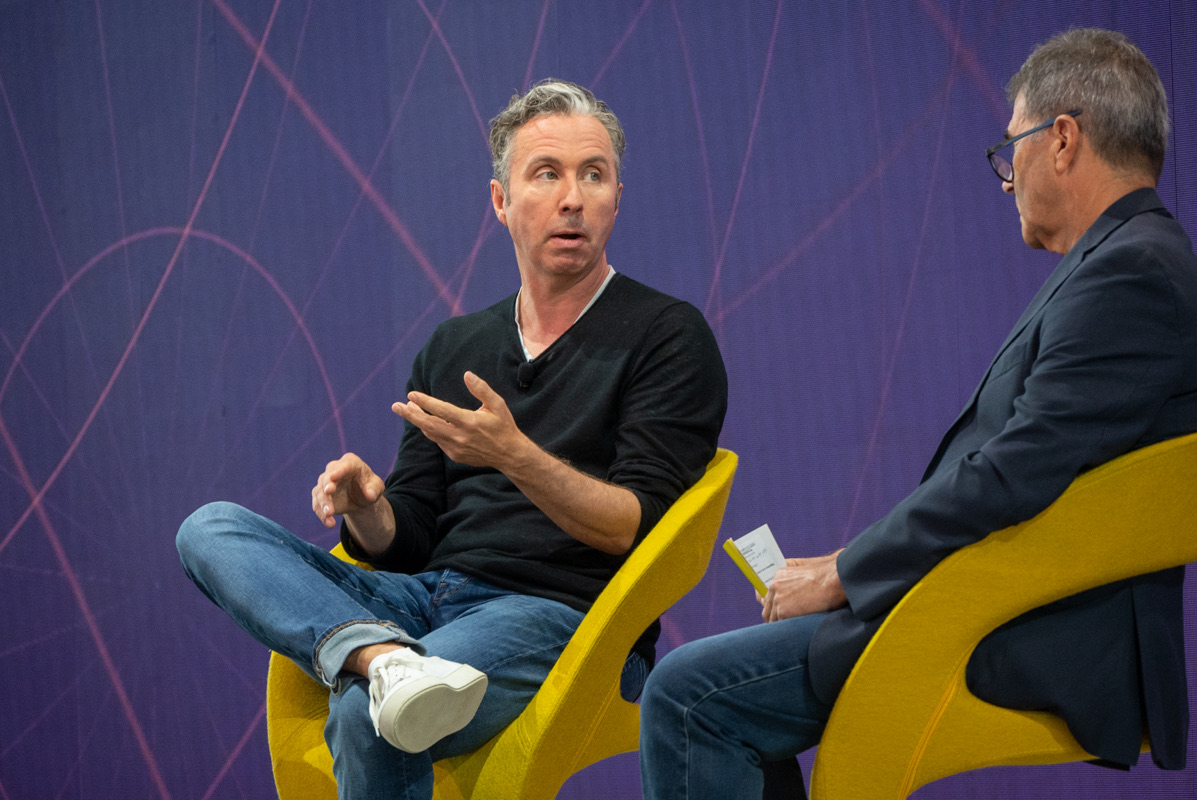Skift Take
Competition certainly played a role in the Expedia-Hopper split. Which company suffered the greatest? The larger company, Expedia, had more resources to absorb a hit.
Hopper founder and CEO Fred Lalonde said Expedia Group’s decision to abruptly remove its hotel inventory in July was driven by competition, and claimed it was Expedia that ended up suffering.
“Expedia lost those bookings, not Hopper,” Lalonde said. Expedia Group provided perhaps half of Hopper’s hotel inventory before the breakup, and Lalonde played down the impact to his own company, adding that 65% of Hopper’s hotel inventory in North America comes from direct relationships.
The Hopper CEO’s comments came on-stage at Skift Global Forum Thursday.
Lalonde said Hopper has 13% marketshare of flights in the U.S., and that it has been taking marketshare from Expedia.
“Where did that share come from over the past four years?” Lalonde asked? Some smaller OTAs (online travel agencies) got in trouble during the pandemic, and we took the share, but the vast majority of it came from Expedia. We have a much better B2B platform, a much better a B2B product, and that’s a huge chunk of their business. So I don’t think there’s any mystery that that reaction was competitive.”
Lalonde, who served as Expedia’s vice president of hotels and packages nearly two decades ago, said he never had a conversation with Expedia Group CEO Peter Kern leading up to the split in July.
Expedia Group wouldn’t comment Thursday about Lalonde’s remarks. But a day earlier, on the same Skift Global Forum stage, Kern addressed the issue.
“When we looked hard at the Hopper product, we felt like it was creating a bad consumer experience that was pushing customers to buy things they either didn’t need or fully understand. And we didn’t want our partners’ products represented in their marketplace,” Kern said.
Kern argued that consumers have to navigate numerous misleading offers on the Hopper app before they can book a flight.
“When we looked at it, you could book a flight with us in six clicks, which is best in class,” Kern said. “On Hopper, it was 27 clicks. Now, you can all decide whether you like that or don’t like that, or decide what you think they sell is good or bad. That’s up to everybody else. We made our decision, which was that we didn’t think it was consistent with how we want consumers to experience our products or our partners’ products.”
Asked about the 27 clicks, Lalonde said Thursday: “I’d like to remind Peter that there’s no clicks on phones, they’re actually taps. So there’s a completely different framework here for what we do, right?”
However, that didn’t address the fact that to book something in the Hopper app one often has to navigate a series of offers along the way.
Lalonde said Hopper’s various fintech products, which enable travelers to freeze airfares or hotel rates for a certain period for a fee, provide value to travelers. Some 60% of Hopper users, which skew younger, pay with debit cards, and 25% of purchasers of its price freeze products said they wouldn’t be able to afford certain airfares otherwise, he said.
Although Lalonde said Thursday that Hopper wasn’t hurt by Expedia’s decision, Hopper earlier this week did sign two deals with wholesalers Hotelbeds and WebBeds to add more than 700,000 hotels to Hopper.
In other news, Hopper announced at Skift Global Forum that it rebranded its Cloud distribution business as HTS (Hopper Technology Solutions), and it was expanding beyond distribution to provide e-commerce services, too.
“What’s happening now is customers are coming to us saying, ‘Would you consider powering the totality of our e commerce website?’ Lalonde said. “We’re in conversations with a lot of partners. These are big public companies, so I can’t talk too specific. But you’re gonna hear a bunch of announcements.”
More than half of Hopper’s revenue comes from these distribution and loyalty partnerships, such as with Capital One, and the company predicted that in 2024 they would generate two-thirds of revenue.
Asked why Hopper isn’t profitable despite the fact that it was founded around 16 years ago, Lalonde said: “It’s not hard to understand, we’re investing heavily now. You’ll see in the next couple years, like everybody else we’re figuring out how to break even. And that’s coming.”
Asked whether a Hopper IPO would take place in 2024, Lalonde said it isn’t a priority for next year but “that’s going to happen eventually.”
Lalonde said he feels good about the IPO market opening up, but Hopper “is in no rush for that.”
Skift Global Forum 2023
The Daily Newsletter
Our daily coverage of the global travel industry. Written by editors and analysts from across Skift’s brands.
Have a confidential tip for Skift? Get in touch
Tags: expedia, expedia group, fintech, flights, hopper, mobile, online travel newsletter, sgf2023, skift live
Photo credit: Hopper CEO and co-founder Frederic Lalonde in discussion with Executive Editor Dennis Schaal at Skift Global Forum 2022. Source: Skift Skift
